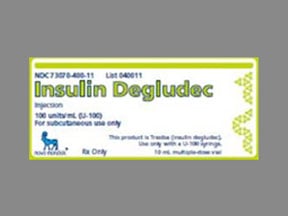
Tresiba Coupons & Savings Card – Discount Prices from $104.15
Brand for: Insulin degludec
My prescription
Edit
10ML of 100UNIT/ML, Insulin Degludec (1 Vial)
Select pharmacy

CVS
$141.54
COUPON PRICE
Walmart
$104.15
COUPON PRICE
Walgreens
$115.14
COUPON PRICE
Albertsons
$123.85
COUPON PRICETresiba savings card
Show this card to your pharmacist
Walmart
$104.15
BIN
ID
PCN
GRP
019876
LH19DFF526
CHIPPO
LHX
Powered by
Related insulins prescriptions
More prescriptions for diabetes type 2
Related insulins prescriptions
More prescriptions for diabetes type 2
Price history for Tresiba (brand) & Insulin Degludec (generic)
1 Vial, 10ML of 100UNIT/ML
Average retail price for Tresiba
Average retail price for Insulin Degludec
Average SaveHealth price for Insulin Degludec
Our price history data is based on aggregated prescription data collected from participating pharmacies in America. Our prescription data updates daily to reflect the latest price changes. If you notice a missing data point, it means there wasn't sufficient data available to generate a monetary value for that date.
Over the last 12 months, the average discount price of Tresiba is $191.65 using the SaveHealth savings card. That's an average savings of -53.87% on Tresiba with our discount card.
*Retail prices are based on pharmacy claims data, and may not be accurate when we don't have enough claims.
Tresiba (Insulin Degludec) dosage forms
Dosage Quantity Price from Per unit 10ML of 100UNIT/ML 1 Vial $104.15 $104.15 10ML of 100UNIT/ML 2 Vials $227.29 $113.64 10ML of 100UNIT/ML 3 Vials $350.43 $116.81
| Dosage | Quantity | Price from | Per unit |
|---|---|---|---|
| 10ML of 100UNIT/ML | 1 Vial | $104.15 | $104.15 |
| 10ML of 100UNIT/ML | 2 Vials | $227.29 | $113.64 |
| 10ML of 100UNIT/ML | 3 Vials | $350.43 | $116.81 |
What type of insulin is Tresiba?
Tresiba is a long-acting insulin, also known as insulin degludec. It is used to help control blood sugar levels in individuals with diabetes.
What drugs should not be taken with Tresiba?
Tresiba (insulin degludec) may interact with several types of medications. It is important to be cautious with the following:1. Other Antidiabetic Medications: Combining with other insulin or antidiabetic drugs may increase the risk of hypoglycemia.2. Beta-Blockers: These can mask the symptoms of hypoglycemia, making it harder to recognize low blood sugar levels.3. ACE Inhibitors and Angiotensin II Receptor Blockers (ARBs): These may enhance the blood-glucose-lowering effect, increasing the risk of hypoglycemia.4. Diuretics: Some diuretics can increase blood sugar levels, potentially counteracting the effects of Tresiba.5. Corticosteroids: These can increase blood glucose levels, requiring adjustments in insulin dosage.6. Thyroid Hormones: May affect insulin requirements.7. Monoamine Oxidase Inhibitors (MAOIs): Can enhance the hypoglycemic effect of insulin.Patients should always consult with their healthcare provider before starting or stopping any medication while using Tresiba to ensure safe and effective management of their condition.
What is the difference between Ozempic and Tresiba?
Ozempic and Tresiba are both medications used to manage diabetes, but they have different mechanisms of action and uses. Ozempic (semaglutide) is a GLP-1 receptor agonist used to improve blood sugar control in adults with type 2 diabetes. It works by stimulating insulin secretion, reducing glucagon levels, and slowing gastric emptying.Tresiba (insulin degludec) is a long-acting basal insulin used to control blood sugar levels in both type 1 and type 2 diabetes. It provides a steady level of insulin to help manage blood glucose throughout the day and night.In summary, Ozempic is a non-insulin medication that enhances the body's natural insulin response, while Tresiba is a long-acting insulin that provides baseline insulin coverage.
